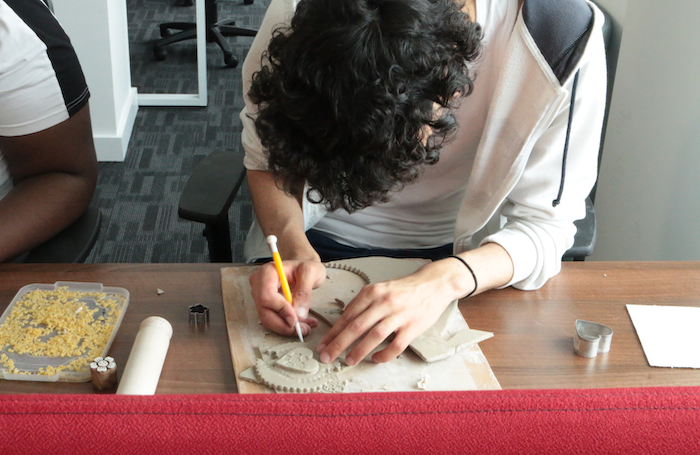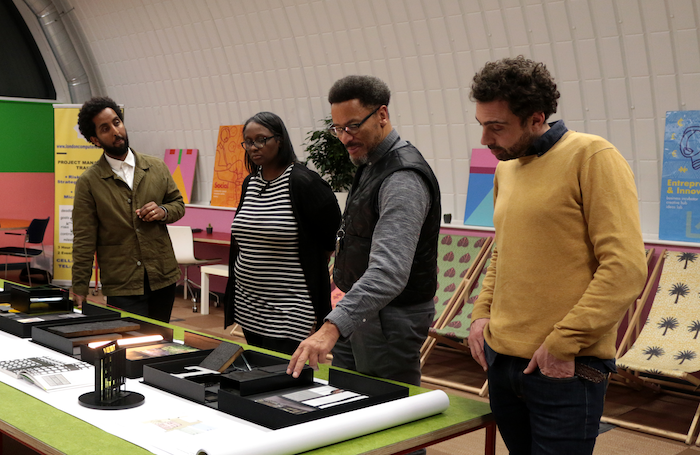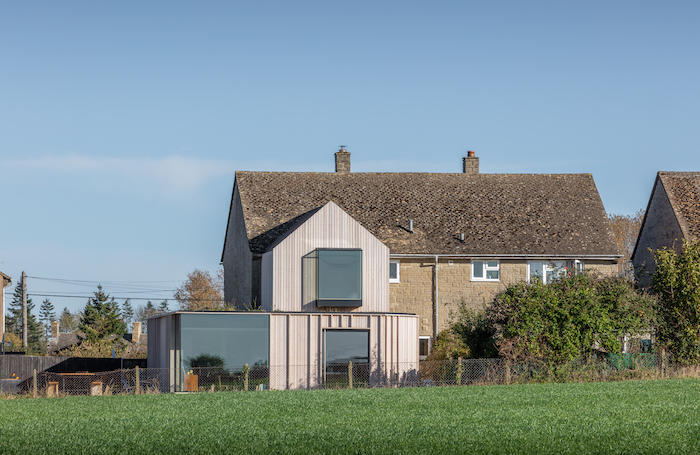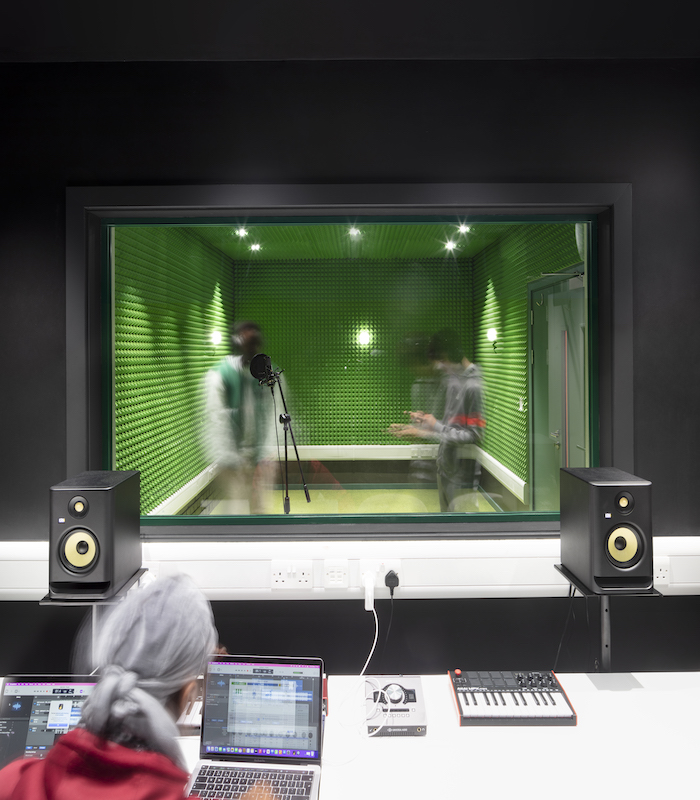This month, we spoke to Freehaus about recently completing a significant retrofit of The Africa Centre at its new home in Southwark, the TET Award-winning Rising Green Youth Hub in Wood Green, as well as working across civic, cultural, and educational sectors.
What do you think is the most important issue for architects to focus on right now, and what are you doing as a practice to tackle it?
Equitable representation within architecture is an important issue to us that we have been thinking about and been active within, since Freehaus was founded.
Truly welcoming buildings that give their users agency and invite them to feel a sense of ownership are only achievable if a spectrum of voices is in the room when crafting these spaces. We see broadening access into the profession for those from under-represented backgrounds as crucial to the specific skill and relevance of the role of the architect.
We actively seek educational and mentoring opportunities with young people as well as architecture students, to help open up pathways into the profession. We have successfully enabled these opportunities to be embedded within a project brief, for example as part of the public engagement strategy for the Shaping Acton project, we involved a local artist to run a workshop at a local youth centre to facilitate discussions about the area with under-represented groups from the local community.
We engage young people in the design process, not just as observers but as participants with agency, via co-design workshops and creative projects. For the Wood Green Youth Hub, local young people were actively involved in not only defining the brief but in developing spatial layouts as well as authoring graphics and photography for the space.
This forms part of our holistic approach to ethical practice - facilitated via our active engagement with the London Practice Forum.

You put a lot of emphasis on collaborating with your clients and end users. Please explain why this is important to you.
Collaboration is core to what we do, whether that be collaboration with our clients, stakeholders, or other practices.
Many of our projects, specifically those within the public sector for local authority clients, are contingent on us working directly with our end user and not purely in engagement terms but co-designing, co-creating and co-authoring the project. In simple terms; defining the brief together, designing together, fabricating together, and ultimately sharing the authorship for the project. A civic responsibility that we wear proudly!
Collaborating allows us to conjure more out of the sum of our parts, avoiding the well-trodden path by sharing ownership, to learn from our clients and local people. Above all, working collaboratively, with other architects in particular, has directed us into new arenas that offer different challenges but can be navigated with meaningful support from fellow creatives.
At a human scale, each of these collaborations brings with it a platform for new voices and ideas; a way for us to create social value and cultural capital in their contexts.

What projects are you working on at the moment?
We have several active projects within the practice, across a range of building typologies and at various stages of delivery which include civic, cultural, food and beverage, educational sectors, and master planning.
Across all our projects we like the client to sit alongside us as an active member of the design team to help deliver a tailor-made project. The approach naturally varies between typologies, with the private nature of a home requiring a different sensitivity to the theatre of dining or brewing coffee, but ultimately the experience of either one of those user groups is no more valuable to us than the other.

Are you part of the RIBA 2030 Climate Challenge? If so, how has your experience been so far?
Freehaus signed up for the 2030 challenge last year and we are advocates of the targets. We recognise that leaving change until 2050 is far too late and that we must act now on the climate emergency.
What is great about the RIBA 2030 Climate Challenge is it has latched on to the wider UN Sustainable Development Goals that include ‘Sustainable Land-use and Ecology and Sustainable Communities and Social Value’, something which has been echoed in the 2021 NPPF drive and we welcome as a practice.
As certified Passivhaus Designers, we believe the regulations should be far more stringent for new build development, but we are also conscious that this only accounts for about 20% of our building stock. We must therefore more actively focus on adaptive reuse - something which has become central to our practice - with low-cost, low-tech improvements to existing buildings at the forefront of our outputs.
For both our new build and retrofit projects, we are incredibly conscious that if we are to succeed in achieving the UK’s targets, we need to reduce energy consumption first before looking to renewable energy sources. By reducing operational energy and embodied carbon, through careful specification of materials and processes, we can make change now - with technological innovations playing a huge role in a more sustainable future.

What is your advice to future generations of architects?
Don’t be afraid to collaborate and in doing so, challenge the status quo. As architects we are often taught to be self-motivated, self-directed and self-sufficient but problems are often best solved through teamwork. Working in creative partnership with others can lead to unexpected and fulfilling results, especially in an increasingly polarised and rapidly changing world. Working together allows us to be more forward-thinking to better anticipate our clients’ future needs, which may require adapting for climate change, energy affordability and material lifespan.
Finally, becoming an architect takes a long time and requires constant learning. There’s no need to rush – take time to follow your interests and find your vocation, even that is outside the profession. Be generous when colleagues can learn from your experience and be inquisitive when others have something wise to offer.
What benefits have you experienced from becoming a RIBA Chartered Practice?
Freehaus have been a RIBA Chartered Practice since 2015, three years after the practice was founded. At that time, we recognised that being chartered would help elevate the status of our practice in the eyes of prospective clients and provide us with the stewardship to grow.
More importantly, the framework the chartership provides, by supporting the development of our own policies, has been instrumental in helping us practice more rigorously and bid for new work more confidently and successfully.
For us, the strength in our relationship with the RIBA has been nurtured by the people behind the scenes - something the chartership gives access to. The RIBA has been our client, commissioner, curator, and collaborator. In addition, the advice line has provided much needed HR, legal, and marketing advice to name but a few of the guises the support from the institution has taken.
As our practice continues to weather uncertain political, environmental and social climates, we will look to the RIBA and our chartership to help provide us with the tools we need to keep our practice resilient and sustainable.
To find out more about Freehaus, visit the Freehaus website or connect with them on Instagram.










